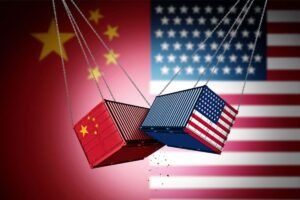In response to the recent imposition of a 25% tariff on imported automobiles by U.S. President Donald Trump, British luxury car manufacturer Jaguar Land Rover (JLR) has announced a temporary suspension of its vehicle shipments to the United States for the month of April 2025. This strategic pause is intended to allow the company to assess the financial implications of the tariffs and to develop strategies to mitigate their impact on its operations and pricing structures.
Background of the Tariffs
On April 3, 2025, the U.S. administration implemented a 25% tariff on imported cars and light trucks as part of a broader initiative to address trade imbalances and encourage domestic manufacturing. This move has elicited varied responses from international trading partners and has introduced complexities for foreign automobile manufacturers exporting to the U.S. market.
Impact on Jaguar Land Rover
The United States represents a significant market for JLR, accounting for nearly 25% of its annual sales, which translates to approximately 100,000 vehicles. The newly imposed tariffs pose substantial financial challenges for the company, potentially increasing the cost of their vehicles in the U.S. market and affecting competitiveness. In a statement, JLR emphasized the importance of the U.S. market and outlined its approach:
“The USA is an important market for JLR’s luxury brands. As we work to address the new trading terms with our business partners, we are taking some short-term actions, including a shipment pause in April, as we develop our mid- to longer-term plans.”
Strategic Considerations and Industry Implications
The temporary halt in shipments allows JLR to evaluate several strategic options, including:
- Pricing Adjustments: Assessing whether to absorb the additional costs imposed by the tariffs or to pass them on to consumers, which could impact sales volumes and market share.
- Supply Chain Reconfiguration: Exploring alternative manufacturing or assembly locations to circumvent tariff barriers, potentially involving increased investment in facilities outside the UK.
- Market Diversification: Enhancing focus on other international markets to offset potential declines in U.S. sales.
This development is indicative of broader challenges faced by the UK automotive industry, which is already contending with declining domestic demand and the transition to electric vehicles. Analysts anticipate that other British car manufacturers may adopt similar measures in response to the tariffs, further highlighting the industry’s vulnerability to international trade policies.
Conclusion
Jaguar Land Rover’s decision to pause shipments to the United States underscores the significant impact of recent U.S. trade policies on international businesses. The move reflects the complexities faced by global manufacturers in navigating an evolving trade landscape and highlights the need for strategic adaptability in response to geopolitical developments. As JLR formulates its mid- to long-term strategies, the automotive industry will be closely monitoring the outcomes and potential ripple effects on international trade and economic relations.
Disclaimer: This article is based on information available as of April 6, 2025. For the most current developments, please refer to official communications from Jaguar Land Rover and relevant news outlets.




















